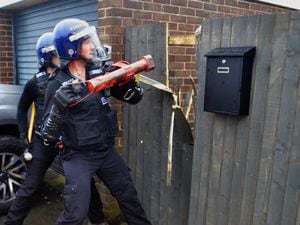Shropshire Star comment: Solution to crime rise is essential
We live in an age of a reduced State. There are fewer public services as the past two Governments have chosen to slim down our public services in order to trim the national deficit.

They have been ideologically opposed to spending sums of money that we either cannot afford or that the government believes are no longer necessary.
And though the age of austerity has been opposed by many – Jeremy Corbyn, for instance, has built his Labour Leadership on that very principle – it is here to stay.
In the spotlight at the moment is our police force. A Home Office report would appear to suggest that cuts in our police services have coincided with new reports that Britain is becoming more violent. Certainly, in our capital city, we have seen an horrific upsurge in the number of murders, knife attacks and other vicious and regrettable crimes.
There are some who are determined that we should not conflate the reduction of police numbers with the upturn in violent crime. They say the two issues are disconnected. And yet the report seems to suggest the reverse; that fewer police officers invariably results in an increase in violent crime.
The truth of those opposing positions is a matter for debate and, irrespective of the outcome, the rise in violent crime has certainly caused concern.
When it comes to the issue of crime, there are more factors at play than simply the number of officers who are able to respond to emergencies.
There has long been a feeling, for instance, that police on the beat not only reduce crime but also offer reassurance to residents, thereby reducing the fear of crime and dissuading some who might be preparing to commit offences.
But the picture is more complex than this. There needs to be further discussion about this very serious issue nationally, in the corridors of power, to ensure that we are being kept safe effectively and that police are given the resources they need to do the job.
See also:
We are told by the region’s police and crime commissioner John Campion that the picture in Shropshire does not accord with the perilous situation in London and other parts of the UK, particularly Metropolitan areas.
Mr Campion argues strongly that we are safer, that police have crime under control and that we need not live our lives in fear for officers are able to protect and serve. He is also keen to point out that policing is changing and that the traditional view of ‘Bobbies on the beat’ is only one element of an increasingly complex picture when it comes to tackling crime.
It is worth noting that officer numbers have increased in West Mercia since 2014 – and yet despite this we have seen violent crime increasing rather than decreasing as the argument about cutting numbers would suggest.
The debate is sensible and timely. Tackling the rise in violent crime will, however, no doubt prove to be more challenging than the Home Office report may suggest.





